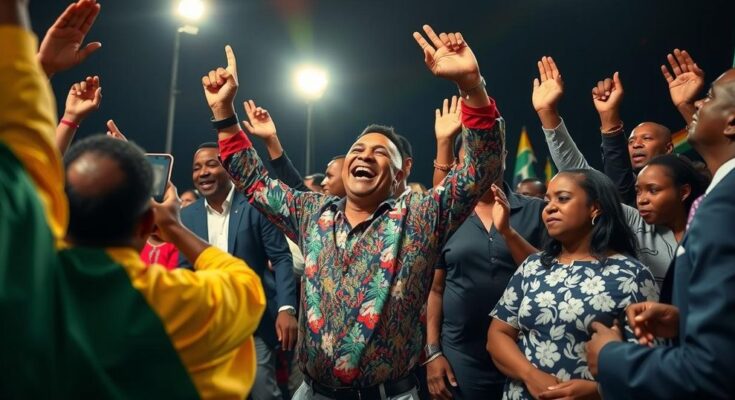Mauritius’ opposition coalition has decisively won the election by securing all parliamentary seats, leading to the return of former Prime Minister Navin Ramgoolam. Prime Minister Pravind Jugnauth conceded defeat amid widespread allegations of corruption against his administration. The elections highlighted the population’s demand for change, with over one million voters participating.
In a significant electoral upset, Mauritius’ opposition coalition has achieved a sweeping victory, winning all available seats in the country’s parliament and marking a decisive rejection of the incumbent government. The governing coalition, led by Prime Minister Pravind Jugnauth, failed to secure any of the 62 directly elected parliamentary seats. Before the official results were finalized, Jugnauth conceded defeat, acknowledging the substantial losses his Militant Socialist Movement coalition faced across all 21 constituencies. This victory heralds the return of Navin Ramgoolam, who previously served as Prime Minister from 1995 to 2000 and again from 2005 to 2014. The election results, which began rolling in throughout Monday, indicated an overwhelming support for the Alliance for Change coalition, underscored by allegations of corruption that plagued Jugnauth’s administration. The forthcoming official results, which will include two additional seats from Rodrigues Island, are expected to solidify the opposition’s triumph, poised to exceed 60 confirmed seats. With over one million registered voters participating, this election underscores a pivotal moment in Mauritian democracy, reflecting the electorate’s desire for change. Mauritius is celebrated for its stable democratic framework and a robust economy driven by finance, tourism, and agriculture since its independence in 1968.
Mauritius is recognized as one of Africa’s most stable democracies. Since gaining independence from the United Kingdom in 1968, the nation has developed a dynamic economy based on various sectors, including finance, tourism, and agriculture. The recent election represents the twelfth since independence, highlighting the country’s political evolution and the active participation of its citizens. The outgoing Prime Minister, Pravind Jugnauth, has faced scrutiny over corruption allegations, which have seemingly influenced public opinion and contributed to the overwhelming defeat of his coalition.
In summary, the recent elections in Mauritius have resulted in a dramatic shift in governance, with the opposition coalition claiming victory in every contested seat. This electoral outcome not only signifies a loss for Prime Minister Pravind Jugnauth but also signals a change in leadership with the anticipated return of Navin Ramgoolam. The election results reflect the electorate’s desire for accountability and reform, positioning Mauritius for potential developments under a new administration.
Original Source: abcnews.go.com




